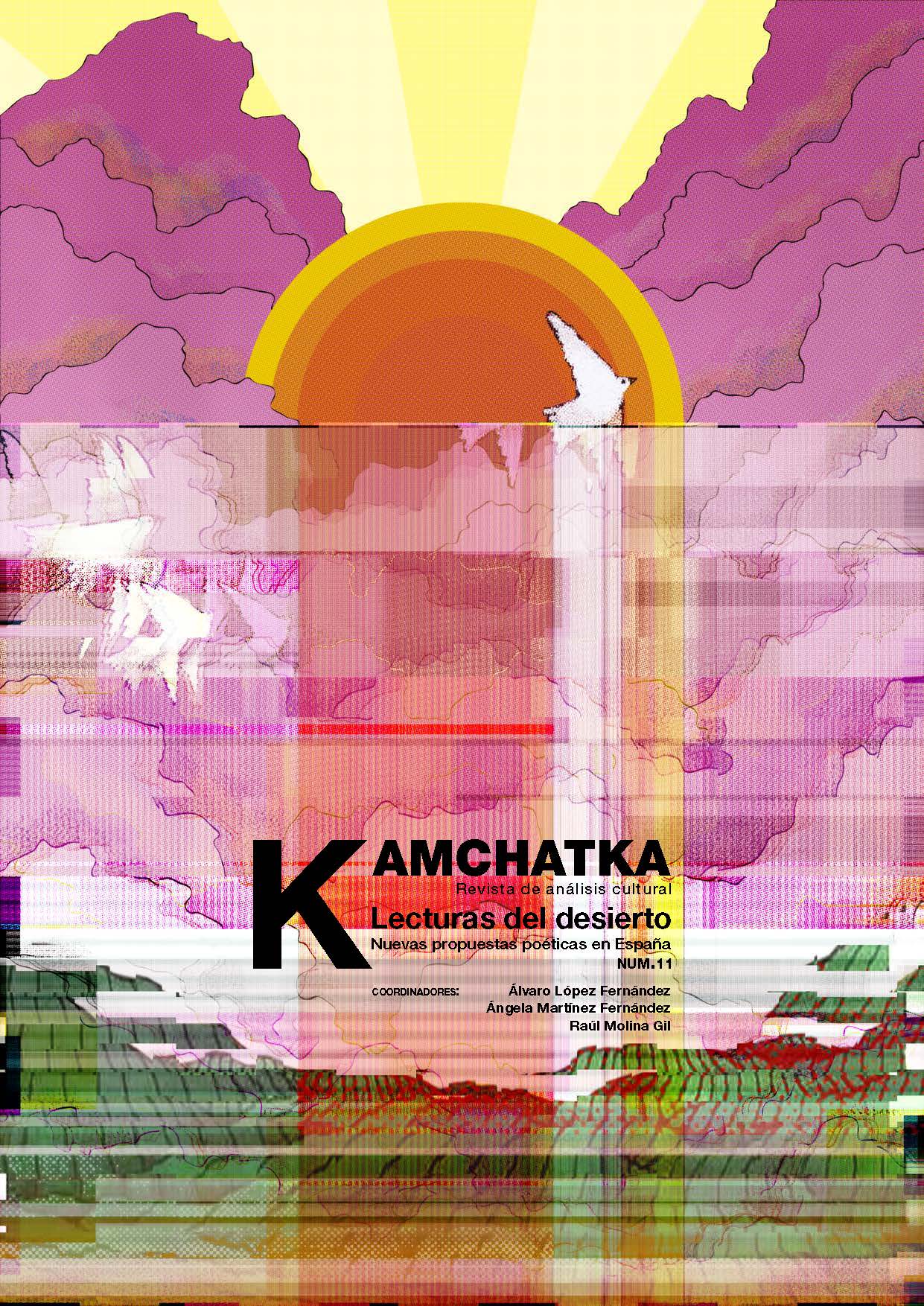Bodies, sexuality and female identity: the poetry of María Sánchez (1989), Luna Miguel (1990) and Elvira Sastre (1992)
DOI:
https://doi.org/10.7203/KAM.11.12184Keywords:
current Spanish poetry, feminism, women writers, body, sexuality, female identity, María Sánchez, Luna Miguel, Elvira Sastre Abstract
Abstract
The claims of the feminism are associated to a reflection about the position that women occupy in the society and reveal the need to think about the way in which the continuous attempt of domination by others on his body establishes a form of violence. However, how to use it as a tool to lead his vindications and to demand the equality that is being constantly damaged is one of the key proceedings for their emancipation. María Sánchez (1989), Luna Miguel (1990) and Elvira Sastre (1992) are three known current writers who represent three different, but parallel, poetical styles of our literary panorama. Their verses have much to say about their women's condition. Through them these authors are reaffirmed as citizens, workers, mothers, daughters or lovers and try to pave their way in a context which is frequently revealed hostile. The pages of their books inquiry reiteratedly in aspects as sexuality, maternity and the relation with their bodies, making up a try to ratify their identity across the poetical writing.
 Downloads
Downloads
 References
References
Ackerman, Galia (2014). En el principio era el cuerpo. Barcelona: Calmann-Levy.
Arjona, Daniel. “«Stop» masturbación: el dedo de Luna Miguel no cabe en Facebook”. El Confidencial (2016).
Ayén, Xavi; Massot, Josep. “Las escritoras denuncian la marginación que sufren en los reconocimientos oficiales”. La Vanguardia (2016).
Caldini, Camille. “Entretien. Geneviève Fraisse, philosophe et historienne: «L’affaire Weinstein est une révolte historique et politique»”. France Télevisions (2017).
Castro, Rosalía (1996). Obra completa. Padrón: Fundación Rosalía de Castro.
D’Angelo, Oriette. “María Sánchez: «El campo es una forma de resistencia»”. Digo.palabra.txt (2017).
Esteban Galarza, Mari Luz (2011). “Cuerpos y políticas feministas: el feminismo como cuerpo”. Villalba Augusto, Cristina & Álvarez Lucena, Nacho (coords.). Cuerpos políticos y agencia. Reflexiones feministas sobre cuerpo, trabajo y colonialidad. Granada: Universidad de Granada: 45-84.
Federici, Silvia (2010). Calibán y la bruja. Mujeres, cuerpo y acumulación originaria. Madrid: Traficantes de sueños.
Fernàndez Lamelas, Eva. “Una revolución silenciosa. Memorias de activismo feminista y vecinal: de la Transición al 15M en Barcelona y su cinturón industrial”. Ankulegi 19 (2015): 25-41.
Fernández Rivero, Juan. “Tocar las vísceras: la poética del cuerpo en ‘Cuaderno de campo’, de María Sánchez”. Ocultalit (2017).
Figuera Aymerich, Ángela (1986). Obras completas. Madrid: Hiperión.
Gómez Urzaiz, Begoña, “El viaje de Ulises”. El País (2016).
Hooks, Bell (2017). El feminismo es para todo el mundo. Madrid: Traficantes de sueños.
H. Riaño, Peio. “Los 21 artistas más influyentes de 2017”. El Español (2017).
Lagarde, Marcela (1996). Género y feminismo. Desarrollo humano y democracia. Madrid: Editorial Horas y horas.
López, Raquel. “La huella de la nueva poesía femenina”. Nomepierdoniuna (2017).
Marçal, Maria-Mercè (2004). Deshielo. Montblanc: Igitur.
Marmisa, Javier. “Día Internacional de la Mujer: La poesía por ellas”. El País (2018).
Martínez, Xaime. “Cuaderno de campo: el poemario que se acerca a la belleza y a la tragedia de los mundos perdidos”. Playground (2017).
Miguel, Luna (2013). La tumba del marinero. Madrid: La Bella Varsovia.
Miguel, Luna (2015). Los estómagos. Madrid: La Bella Varsovia.
Miguel, Luna. “Cuando ser escritora es sinónimo de humillación, desigualdad y acoso sexual”. Playground (2017a).
Miguel, Luna (2017b). El arrecife de las sirenas. Madrid: La Bella Varsovia.
Miguel, Luna. “Poesía masculina”. Luna Miguel Blogspot (2017c).
Morante, José Luis (2016). Re-generación. Antología de poesía española (2000-2015). Granada: Valparaíso.
Nash, Mary. “Experiencia y aprendizaje: la formación histórica de los feminismos en España”. Historia Social 20 (1994): 151-172.
Neira, Nieves. “María Sánchez: «El campo es mi narrativa invisible, donde surge todo»”. El progreso (2017).
Pahud, Stéphanie. “Le corps exhibé: un texte singulier du féminisme quatrième génération”, Argumentation et Analyse du Discours, 18 (2017)
Romero Pérez, Rosalía. “Desobediencia civil, feminismo y cuerpo”. Investigaciones feministas, Vol. 6. (2015): 153-171.
Ruíz Mantilla, Jesús. “Soy poeta y vivo de esto”. El País (2018).
Salgado, Purificación. “L. Miguel: «Como la diabetes, la Literatura es una enfermedad crónica»”. Personas que (2013).
Sánchez, María (2017). Cuaderno de campo. Madrid: La Bella Varsovia.
Sastre, Elvira (2016). La soledad de un cuerpo acostumbrado a la herida. Madrid: Visor.
Sastre, Elvira (2015). Ya nadie baila. Granada: Valparaíso.
Segato, Rita Laura (2016). La guerra contra las mujeres. Madrid: Traficantes de sueños.
Woolf, Virginia, (2018). Una habitación propia. Barcelona: Seix Barral.
Yuste, María. “Hablamos con la poeta Luna Miguel más allá de su edad o número de seguidores”. Nylon (2017).
Downloads
Published
How to Cite
-
Abstract2134
-
Artículo (Español)1314
Issue
Section
License
This journal provides an immediate free access to the content on the principle that freely make investigation available to the public, which promotes an increased global knowledge exchange.
Unless otherwise indicated, texts published in this journal are under the license Attribution-NonComercial 4.0 by Creative Commons. These texts may be copied, distributed and publicly communicated whenever the publication’s author and title are quoted and whenever they are not used for commercial purposes. In any case, intellectual property of the articles and its potential economic rights entirely belong to its authors.
The full license can be consulted on https://creativecommons.org/licenses/by-nc/4.0/. We encourage authors to disseminate papers published in Kamchatka. Journal of cultural analysis electronically, in institutional digital repository or in their websites.





